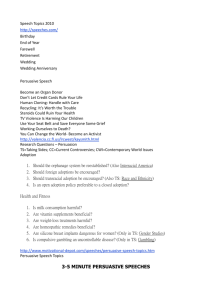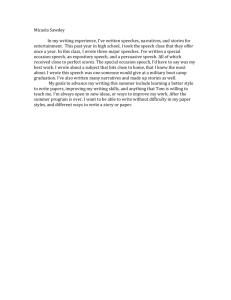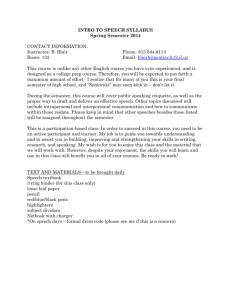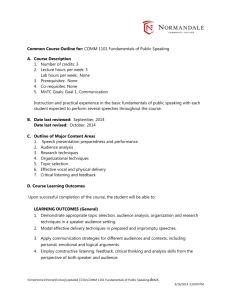gafl 502 - Fels Institute of Government
advertisement
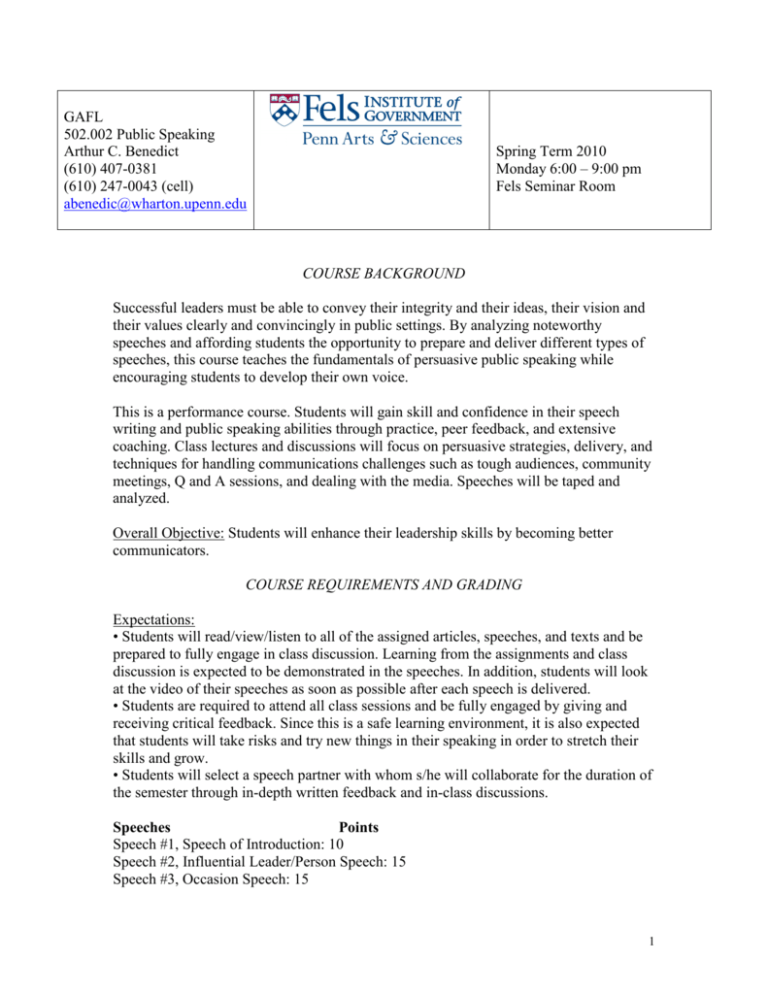
GAFL 502.002 Public Speaking Arthur C. Benedict (610) 407-0381 (610) 247-0043 (cell) abenedic@wharton.upenn.edu Spring Term 2010 Monday 6:00 – 9:00 pm Fels Seminar Room COURSE BACKGROUND Successful leaders must be able to convey their integrity and their ideas, their vision and their values clearly and convincingly in public settings. By analyzing noteworthy speeches and affording students the opportunity to prepare and deliver different types of speeches, this course teaches the fundamentals of persuasive public speaking while encouraging students to develop their own voice. This is a performance course. Students will gain skill and confidence in their speech writing and public speaking abilities through practice, peer feedback, and extensive coaching. Class lectures and discussions will focus on persuasive strategies, delivery, and techniques for handling communications challenges such as tough audiences, community meetings, Q and A sessions, and dealing with the media. Speeches will be taped and analyzed. Overall Objective: Students will enhance their leadership skills by becoming better communicators. COURSE REQUIREMENTS AND GRADING Expectations: • Students will read/view/listen to all of the assigned articles, speeches, and texts and be prepared to fully engage in class discussion. Learning from the assignments and class discussion is expected to be demonstrated in the speeches. In addition, students will look at the video of their speeches as soon as possible after each speech is delivered. • Students are required to attend all class sessions and be fully engaged by giving and receiving critical feedback. Since this is a safe learning environment, it is also expected that students will take risks and try new things in their speaking in order to stretch their skills and grow. • Students will select a speech partner with whom s/he will collaborate for the duration of the semester through in-depth written feedback and in-class discussions. Speeches Points Speech #1, Speech of Introduction: 10 Speech #2, Influential Leader/Person Speech: 15 Speech #3, Occasion Speech: 15 1 Speech #4, Informative Briefing using Visual Aid: 25 Speech #5, Persuasive Speech (Tough Audience): 40 Speech #6, Community Meeting/ Public Hearing (Options: media or impromptu): 45 Speech #7, Final Speech: Inspiring Your Audience: 50 Total Speeches: 200 (80%) Participation Includes attendance, individual meeting with instructor, class participation, working with with speech partner and giving partner written feedback: 50 Total Participation: 50 (20%) Total: 250 (100%) In general, speeches will be graded on content, structure, and delivery. Individual speeches may have more specific grading criteria. If so, they will be included on the detailed speech assignment. STUDENT CONDUCT Students are expected to submit their own work, and presenting the work of others as their own is not acceptable. In recent years, university students around the world have been tempted to appropriate information from the internet and present it as their own. The incidence of this practice apparently is increasing. Suspected instances of plagiarism or other abuses in this course will be referred to the University Office of Student Conduct, and the students involved will be given grades of Incomplete for the course until the situation is resolved. Speeches are expected to be given on the assigned date. Students who give speeches after the due date may receive lower grades at the sole discretion of the professor. ATTENDANCE The course is planned on the assumption that students will attend all classes; students who miss classes should make arrangements to catch up without delay on the material presented. Final grades of Incomplete will not be given except under extraordinary circumstances such as medical emergencies. Outside these extraordinary circumstances, if work has not been completed by the end of the course, a final grade will be assigned based on the best information available at the sole discretion of the professor. Students are responsible for meeting all schedule commitments, including drop and add notifications, as well as for meeting all other program and degree requirements. 2 READINGS Please purchase the Course Pack at the Campus Copy Center (3907 Walnut Street). All reading assignments are listed by the class they are due (including Class One). In addition, there may be assignments not contained in the syllabus (e.g., viewing or attending speeches, etc.). SCHEDULE BY WEEK SPRING 2010* (Please note: no class January 18—Martin Luther King Holiday) Week 1 (1-25) Read Week 1 Assignment • Introduction to the course • Lecture: “Finding One’s Voice and Speaking the Truth” • View and discuss Barbara Jordan’s Impeachment Hearing Statement (1974) and Robert F. Kennedy’s extemporaneous “eulogy” for Dr. Martin Luther King, Jr. (1968) • Impromptu Speech with playback and feedback (1-2 minutes) (un-graded) • Select Speech Partner Assignment: Prepare Speech # 1—Speech of Personal Introduction (2 minutes) (10) (Note: Detailed Assignments for each class are posted on Blackboard.) Due Week 2. Week 2 (2-1) Read Week 2 articles on speaker anxiety Analysis and Discussion: Martin Luther King’s “I Have a Dream” Speech (1963); analyze delivery techniques (e.g., cite Obama, Clinton, et al) • Lecture on Anxiety and Delivery • Speech # 1: Speech of Introduction, “What Makes You You?”(2 minutes) • Feedback: Receive feedback from speech partner, class, and instructor • Sign up for Individual Coaching Session Assignment: Prepare Speech # 2—Influential Leader/Person Speech (3 minutes) (15) Due Week 3. Locate, read and bring to class copy of the Declaration of Independence; view the late Professor Randy Pausch’s “Last Lecture”. **Week 3 (2-8) Read Week 3 articles on organization Analysis and Discussion: Declaration of Independence and the “Last Lecture” • Lecture: “Organizing Your Thoughts so that the Audience can Follow You” • Speech # 2: Influential Leader/Person Speech (3 min.). Focus on structure—a beginning, middle, end. • Feedback: on structure with speech partner and class Assignment: Prepare Speech # 3—Occasion Speech—e.g., speeches of introduction, eulogy, award, toast, event, ceremony, etc. (2 minutes) (15) Pick/prepare one type of Occasion Speech. Focus on vocal variation. Also, locate and bring copy of Lincoln’s Gettysburg Address to next class. Due: Week 4. **Week 4 (2-15) (Scheduled Coaching sessions before and after class) # Read Week 4 articles on how to write a speech Analysis and Discussion: Lincoln’s Gettysburg Address; Rep. Barbara Lee’s speech against war resolution—occasion speeches to establish tone/direction, commemorate event, express a belief, etc. • Lecture: “Writing for the Ear: How to Write a Speech” • Speech # 3: Occasion Speech – focus on vocal variation 3 • Feedback on speech Assignment: Begin work on Speech # 4—Informative Briefing using PowerPoint or other visual aid (3-4 minutes) (25) Due: Week 6. Read Week 6 materials on Presentations and Visual Aids; View and analyze Steve Jobs “iPhone Introduction” Presentation at 2007 MacWorld. (Coaching Sessions only Week 5) Week 5 (2-22) (Note: Entire Class devoted to Coaching sessions only) Only those scheduled for coaching are required to attend at their assigned time. Assignment: Prepare Speech # 4—Informative Briefing using PowerPoint or other visual aid (3-4 minutes) (25) Due: Week 6. Read Week 6 materials on Presentations and Visual Aids; View and analyze Steve Jobs “iPhone Introduction” Presentation at 2007 MacWorld. (on YouTube) **Week 6 (3-1) (Remainder of Coaching sessions before and after class) # Read Week 6 materials on Presentations and Visual Aids Discuss Steve Jobs “iPhone Introduction” Presentation (2007 MacWorld) • Brief Lecture: “Preparing and Presenting Visual Aids Effectively” • Speech # 4: Informative Briefing on any subject (3-4 minutes) • Feedback on briefing Assignment: Begin preparation of Speech # 5: Persuasive Speech to a tough audience (5-6min.) (40) Due: Week 8 and Week 9 (half the class each week); Watch Richard Nixon’s “Checker’s” Speech (1952); bring text of the speech to class for discussion; read Week 7 materials on Persuasion. (Note: no student speeches in Week 7 except make-up speeches) (Spring Break begins 3-5 and ends 3-15; there will be class 3-15) **Week 7 (3-15) (Note: Entire class devoted to lecture/discussion of Persuasion) Read Week 7 materials on Persuasion Analyze and Discuss Richard Nixon’s “Checkers” Speech (1952) • View and critique JFK’s Houston Ministers Speech and Q&A following speech (1960) • Lecture: “Persuading Tough Audiences using Ethos, Logos, and Pathos”; handling tough questions • Make up speeches (if necessary) Assignment: Prepare Speech # 5: Persuasive Speech to a tough audience on a serious topic; e.g., a government, business, or social issue you feel strongly about. Use speech to persuade this audience which consists of at least a few people who will be unfavorable to your stance to at least listen and perhaps even reflect a little more on the issue. Be prepared to answer a couple of questions from audience after speech. (5-6 min.) (40) Due: Weeks 8 and 9 (half the class each week) Week 8 (3-22) • Speech # 5: Persuasive Speech to Tough Audience (40) (half the class) • Lecture: Speaking at Meetings, Hearings, etc. Assignment: Begin preparation of Speech # 6—You have three options: 1.) You can speak at a Public Meeting or Hearing or address a Board of Directors; OR, 2.) you can conduct a Press Conference; OR, 3) you can give an impromptu speech on a topic assigned that night. The choice is up to you. The options are detailed in the assignment on Blackboard. Whichever option you select, be prepared for several questions from the audience. (45) Due: Week 10 and Week 11—half the class Week 10; remainder of Class Week 11. Read Week 9 materials on dealing with the media. **Week 9 (3-29) Read Week 9 materials on dealing with the media. • Lecture: “Filling the Information Void: Dealing with the Media and the Public in Crisis Situations” • Speech # 5: Persuasive Speech to Tough Audience (40) (Remainder of the class) • Questions and feedback from class Assignment: Prepare Speech # 6 (See options on Blackboard); Look at and be prepared to discuss in Week 10 FDR’s First Inaugural Address (1933) 4 **Week 10 (4-5) • Lecture: “What does it take to inspire people?” and additional comments on writing and delivering longer speeches Analysis and Discussion of FDR’s First Inaugural Address (1933) Show and Discuss Steve Jobs Stanford University Commencement Address (June 2005) • Speech # 6: Three Options: Speech at Community Meeting/ Public Hearing or Board/Council followed by Q&A; Press Conference; Impromptu speech. (45) (Half the class) • Questions and feedback from class Assignment: Prepare final speech, Speech # 7—8-10 minute Inspirational speech. (50) Half the class will deliver speech Week 12; the remainder of the class will deliver speech Week 13. Please invite guests. Week 11 (4-12) Analysis and Discussion of a selected Winston Churchill Speech • Speech # 6 (45) (Remainder of the class) • Questions and feedback from class Week 12 (4-19) Note: this class meets in Auditorium to be assigned; Guests are welcome Analysis and Discussion of a selected Barack Obama Speech or other major speech • Speech # 7: 8-10 minute Inspirational Speech (50) (half of the class) • Questions and feedback from class Week 13 (4-26) Note: this class meets in Auditorium to be assigned; Guests are welcome Final Class Analysis and Discussion of John F. Kennedy’s Inaugural Address (1961) or other major speech • Speech # 7: 8-10 minute Inspirational Speech (50) (Remainder of the class) • Questions and feedback from class • Final Impromptu Speech (un-graded) • Review and Wrap-up the course Notes: * All Assignments are reviewed in detail on Blackboard ** Classes marked with double asterisk have Lecture Notes available for them on Blackboard # Individual coaching is available on request throughout the semester 5


